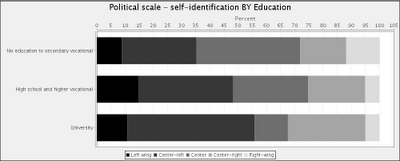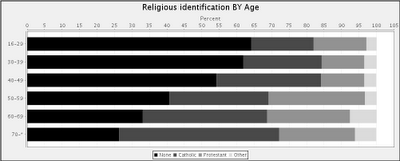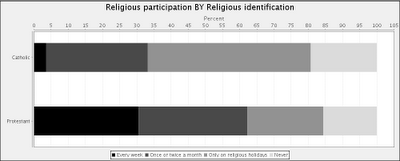In case you didn’t know, the SDA Archive has more than the GSS. For example, something called the Dutch Prejudice Survey 1998. Poking around, I confirmed a general trend you see in the GSS, more educated people tend to be ideologically polarized:
Though I am skeptical that more education makes one more intelligent, I do think that education can make one more reflective about one’s beliefs and align those beliefs more coherent with one’s political preferences. Since everyone in the mainstream seems to agree that college is something that more and more young people should do, we can expect fewer totally incoherent swing voters, but also more ideological polarization.
Or look at this, a massive increase in the “None” category in regards to religion down the age cohorts, and in particular a collapse of Catholicism. In the youngest age cohorts Catholics and Protestants are at parity once more.
I assume that this is a function of latency in Catholic secularization vis-a-vis Protestants. Now looking at religious intensity across the two confessions for those under the age of 40, and the difference is stark:
A much larger number of young Protestants are frequency church-goers. Looks like Protestantism went through secularization first, but adapted and bounced back, or is just institutionally more robust in a secular-dominated environment (Dutch Protestants are divided between various groups, according to the degree of liberalism, orthodoxy, etc.). A quick spot check with the WVS in Germany shows that this dynamic is not true in there, where Catholics seem moderately more observant than Protestants.


